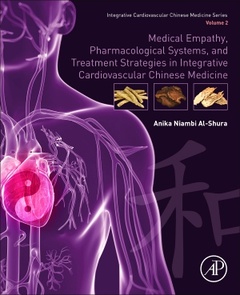Description
Medical Empathy, Pharmacological Systems, and Treatment Strategies in Integrative Cardiovascular Chinese Medicine
Volume 2
Author: Al-Shura Anika Niambi
Language: English
Subject for Medical Empathy, Pharmacological Systems, and Treatment...:
Keywords
Acute stage; Angiotensin-converting enzyme inhibitor nutrients; Antiarrhythmic drugs; Antiarrhythmic nutrients; Antibiotic nutrients; Anticoagulants; Antiglycemics; Antiglycerides; Antihypertensive nutrients; Antihypertensives; Antilipidemic nutrients; Antithrombotic nutrients; Arrhythmia; attuning; Body constitutions; Cardiac rhythm diseases; Chronic stage; Common cardiovascular disease conditions; Delivery types; detached cognition; Diabetes; Diuretic nutrients; Diuretics; Drug classes and types; emotional resonance; Government regulation of nutritional supplements; Herbal formulas only; Herbal preparations; History of nutritional supplementation in the United States; history of pharmacology; History of traditional Chinese medicine; Hypertension; Inotropic drugs; Integration of herbs; Integrative cardiovascular Chinese medicine; integrative cardiovascular Chinese medicine; Lipoprotein disorders; Nitrates; Nutrition and pharmaceutical drugs; Nutritional supplements; patient compliance
196 p. · 19x23.3 cm · Paperback
Description
/li>Contents
/li>Readership
/li>Biography
/li>Comment
/li>
Medical Empathy, Pharmacological Systems, and Treatment Strategies in Integrative Cardiovascular Chinese Medicine, volume two in the Integrative Cardiovascular Chinese Medicine series, presents sections on holism and humanity in medicine, considering the patient, medical empathy in prescribing, modifying and weaning, an overview of pharmacologic systems, an overview of pharmacology sciences and the cardiovascular drug classes and types as revealed from perspectives of Chinese and Western medicine, including descriptions of pharmaceutical drugs from China and the United States, with current pictures and inpatient directions. Finally, principles and treatments according to disease stages for each cardiovascular disease within the scope of integrative medicine is outlined.
This important reference will aid cardiovascular researchers in the study of integrative Chinese and Western medicine and provide a clear, structured base to guide clinical practice and encourage collaboration between Chinese and Western medicine practitioners
Part I: Medical Empathy in Prescribing, Modifying and Weaning 1. Discussion of Disease Stages and Rationale During Treatments2. Partnering with Compliant Patients
Part II Basic Overview of Pharmacologic Systems3. Discussion of Drug Classes and Types4. Traditional Chinese Medicine5. Nutritional Supplements6. Pharmaceutical Drugs
Part III Treatment Principles and Strategies7. Treating According to Disease Stages8. Lipoprotein, Hypertension and Diabetes9. Cardiac Rhythm Diseases10. Chamber and Valve Diseases11. Vascular Diseases
Dr. Al-Shura has 14 continuous years of formal education involving Traditional Chinese Medicine (TCM) clinical practice, advanced medical study, research and education between the United States, Italy and China. In 2004, her master’s degree in Oriental Medicine was earned from East West College of Natural Medicine in Florida, USA. In mainland China between 2004 and 2014, she earned hospital study, advanced scholar and specialty certificates in Chinese medicine, internal medicine and surgery and cardiology from several university affiliated hospitals. Those hospitals include Shandong University of Traditional Chinese Medicine, Shandong Provincial Hospital and Tianjin University of Traditional Chinese Medicine. Her subspecialty training in TCM is in interventional cardiology involving the catherization lab.
Dr. Al-Shura earned her PhD in medical education in 2014 through the University Ambrosiana program. Her dissertation on Integrative Cardiovascular Chinese Medicine (ICCM) became her first textbook entitled, “Integrative Cardiovascular Chinese Medicine: A Personalized Medicine Perspective. This book was one of 7 textbooks written to introduce the concepts of ICCM. All were published and released together through Elsevier Academic Press in 2014. Those textbooks are utilized for the level 1 program studies in ICCM with continuing medical education (CME) courses. Eight additional textbooks were written on the establishment and development of intermediate ICCM theories and practices. Those textbooks are utilized for the level 2 program CME studies in ICCM. Those 8 textbook
- Integrates Western and Chinese Medicine for a realistic and complete scope of cardiology treatment, establishing the basis for standardization and rationale of inclusion of Traditional Chinese Medicine in cardiology
- Identifies and inspires ideas where future research can develop and strengthen
- Contains a breakdown comparison of herb and drug formula constituents on the pharmacokinetic and dynamic level
- Includes personalized medicine explaining the human genetics associated with the use of medicines and the advantages/disadvantages of herbs and/or drugs within treatment




